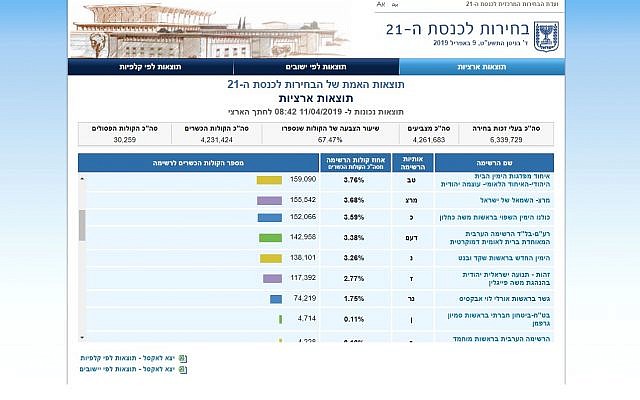There is no reason to believe that anything untoward is going on. But delays, discrepancies and technical hitches threaten to undermine confidence in the results

Savvy reporters and commentators on Israeli politics have one rule on election night, learned the hard way over years of bitter experience: When the exit polls are published at 10 p.m., tell your readers, viewers and listeners not to take them too seriously.
Election after election has confirmed that these polls, no matter how dramatically and confidently presented by the TV anchors and their statistically expert sidekicks, are routinely inaccurate. Hence the imperative to wait a little before ascribing victory or drawing any other dramatic conclusions; to be patient until a goodly proportion of actual votes have been counted, usually just three or so hours later.
Evidently, nobody had taught Benny Gantz, the neophyte politician who challenged Benjamin Netanyahu in Tuesday’s elections, this most basic lesson of election night reality. And so it came to pass, after one of the three main exit polls, the one broadcast by Israel’s most-watched TV channel, Channel 12, projected at 10 p.m. that Gantz’s Blue and White party would outscore Netanyahu’s Likud by 37 seats to 33 seats, and that Gantz might be able to cobble together a majority coalition, Gantz made his way to his party’s election night gathering and announced to his jubilant supporters that “I will be the prime minister” and form a governing coalition “that represents the whole of Israel.”
Gantz’s premature announcement was especially ridiculous in that he made it two hours after the exit polls had been broadcast, by which time every watching Israeli had long since noticed that the Channel 12 poll was an outlier; the two other exit polls, from Channel 13 and the Kan state TV broadcaster, had both shown Netanyahu with a clear path to a majority coalition. (Even Channel 12 had long since been showing all three exit polls at the bottom of its screen, highlighting the discrepancies.) That didn’t mean the two other polls were necessarily any more reliable than Channel 12’s, but it most certainly did underline the foolishness of making grandiose statements on the basis of any of them.

What has been playing out since those exit polls were published, however, is what is supposed to be the dependable part of the post-election vote reporting process — the part we can rely upon, the part where the august, experienced, non-ratings driven, non-deadline-bound Central Elections Committee efficiently counts the actual votes, and keeps the electorate informed on its progress via its website.
Except that’s not what has been happening.
Overnight Tuesday-Wednesday, the count initially proceeded at a curiously glacial pace. Only some 4.3 million Israelis had voted, and it seemed to be taking an unusually long time for a significant proportion of that number to be recorded and totaled.
Close inspection of the site in the course of Wednesday, furthermore, suggested some curious anomalies, including recorded turnouts of over 500% in one area and well over 100% in several others; reports also noted (Hebrew) extremely improbable results in certain areas, including strong support for one of the Arab parties in the Bat Ayin settlement south of Jerusalem. Officials from the committee were quoted as citing technical errors.
As Wednesday gave way to Thursday, however, and the final 6% of the vote was being tallied — the “extra” votes from soldiers and diplomats that take longer to finalize because checks must be made to ensure that soldiers, for instance, did not vote both at their bases and at their local residential polling station — what had appeared to be a minor irritant had become far more dramatic: The New Right party of Naftali Bennett and Ayelet Shaked had been stuck just below the 3.25% threshold for Knesset representation, and had been pinning its hopes on the soldiers’ votes to lift it into parliament — from zero seats to four.
And indeed, as of 8:42 a.m. on Thursday, its hopes appeared to have been rewarded: The Central Elections Committee site showed the New Right at 3.26%, in the Knesset after all.

Or not.
By about 10 a.m., an official from the committee was briefing reporters that the site was wrong; there was a bug; New Right was actually at 3.22% with all votes now counted — a crucial 1,380 short of winning any seats. At the same time, the committee itself, while confirming that the vote count was complete, said it was waiting a little longer to formally announce the results, having decided to do some final checks because the count was so close and sensitive.
As of early Thursday afternoon, with the formal announcement still said to be imminent, word from the committee was that the final totals, with those last extra 6% of the votes, would affect several parties; several would win or lose seats by comparison with their standings before the extra votes were counted. Ordinarily, this would be unsurprising; but in the climate of technical difficulty and suspicion now prevailing, it seemed likely to intensify the swelling chorus of complaint — led by New Right, but not limited to New Right — about the counting process.
The need to regard Israel’s unofficial polling data with suspicion is a function of simple arithmetic: When you have dozens of parties competing for seats; when you have an electoral threshold that can lift any of those parties from zero to 4 seats on the strength of a single vote; when you are trying to survey a public that speaks many languages, with some sectors more prone to answer pollsters who call them, and some sectors more prone to answer pollsters who email them, and all manner of other permutations besides… polling will by definition be unreliable.
But the actual count? That is something whose accuracy we have hitherto depended upon in Israel, and need to be able to depend upon.

As of this writing, the Central Election Committee’s public website shows New Right at 3.26% — that is, winning four seats in the Knesset. Committee officials have been saying for hours that this is not the case, however — that the New Right has failed to clear the threshold — that the count is accurate but there were issues feeding the figures into the site, again citing technical issues. What is the Israeli voting public expected to make of this? If the site is inaccurate, for a start, why not say so? On the site.
There is at this writing no remotely credible reason to believe the assertion by anonymous New Right sources that the election is being “stolen.” But the longer this farce continues, the greater the damage to the credibility of the electoral count process. And the greater the likelihood, once official results are officially announced, that they will be challenged — ironically in the very Supreme Court whose powers a reelected Shaked has promised she would seek to limit.
And, finally, the greater the danger that, whatever the eventual resolution, a proportion of the public will have lost a little of its faith in the integrity of the election process.
As reported by The Times of Israel
